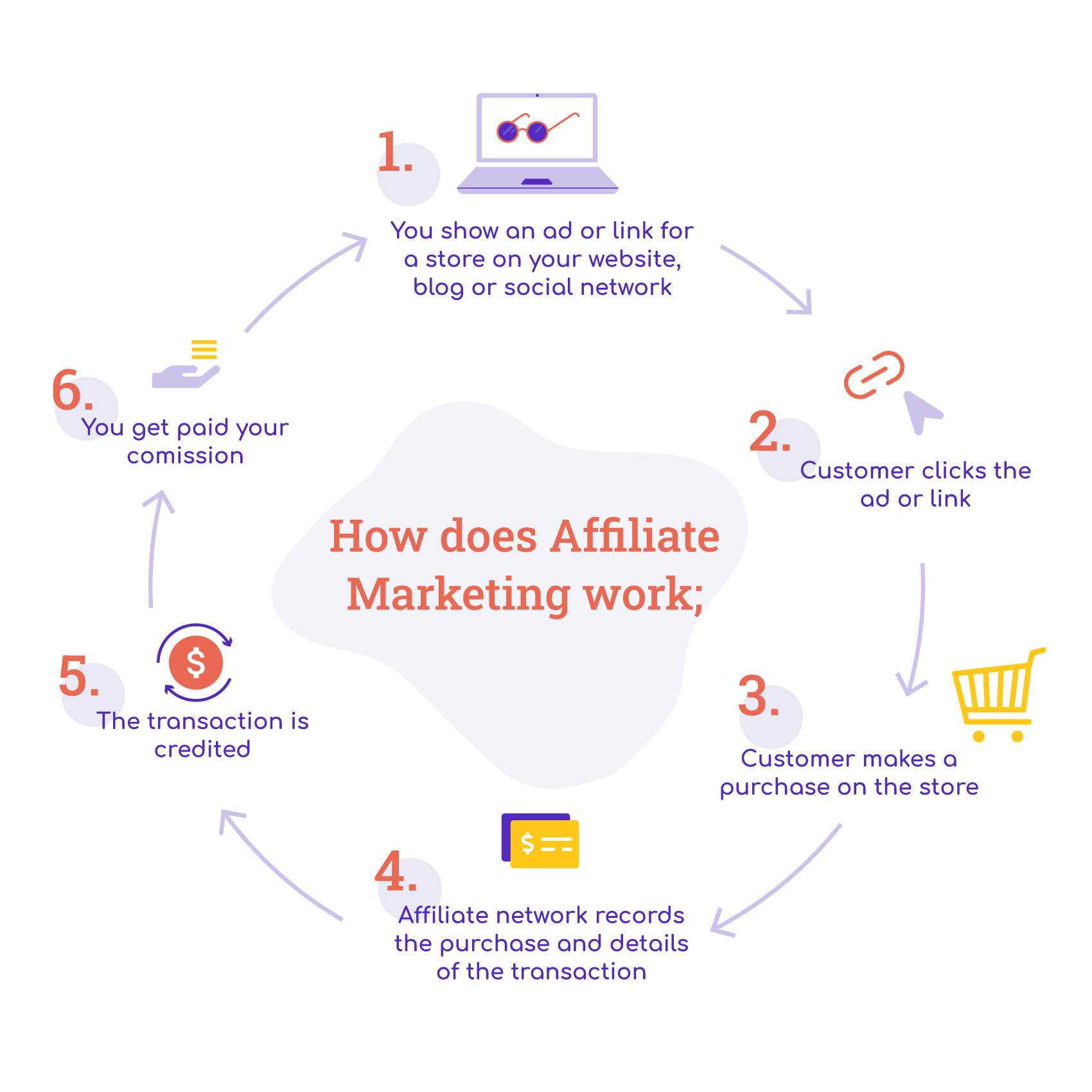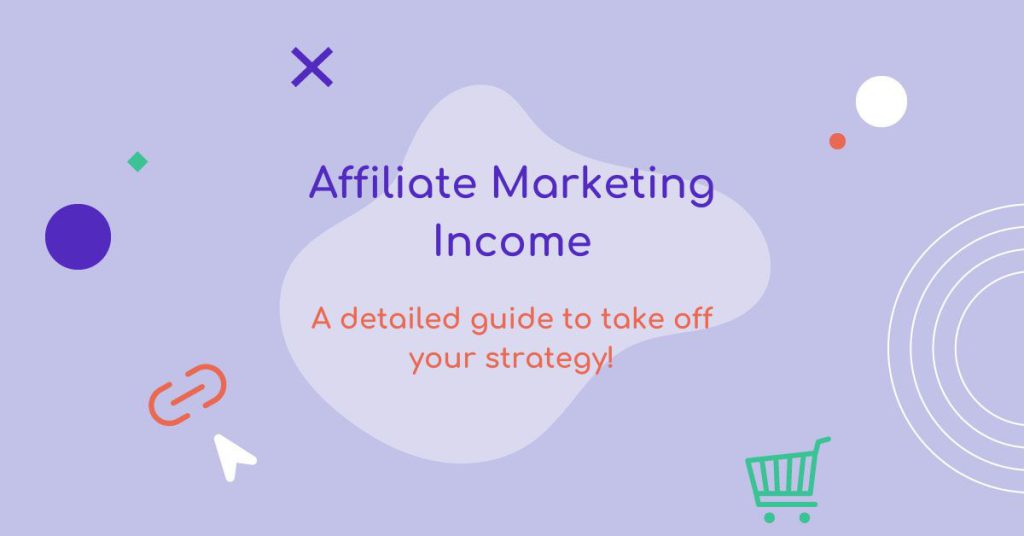In recent years, the concept of Affiliate Marketing has been gaining ground in the field of Digital Marketing. If you are involved in digital marketing, you will surely have heard of this much talked about and often misunderstood practice.
But what is Affiliate Marketing? How does it work and how can you make money and grow your business using this model?
So, in this article, we will answer your questions and break down the successful tactics you need to follow to take off your Affiliate Marketing Strategy in 2024!
But first, let’s get things started for our Affiliate Marketing guide!
Table of Contents
- What is Affiliate Marketing?
- Who is the Merchant and how does he benefit from Affiliate Marketing?
- Who is the Advertiser and what are their benefits from Affiliate Marketing?
- How to start Affiliate Marketing!
- 6 Tactics You Shouldn’t Skip
- Known examples of Affiliate Marketing
What is Affiliate Marketing?
Affiliate Marketing is a widely used form of online marketing that operates on a Performance-based model. At its core, it involves a partnership between an advertiser or Merchant and an affiliate.
The relationship between these two parties works as follows:
The advertiser (or Merchant) uses affiliate distribution platforms to create targeted and useful content that promotes their products. The affiliate then leads visitors to the Merchant’s website using affiliate links. If any of these visitors complete a pre-agreed action or purchase, the affiliate receives a commission.
In turn, the advertiser pays the affiliate a commission every time they achieve the goals set out in their partnership. This payment model is known as Cost per Action (CPA), which sets Affiliate Marketing apart from other advertising tactics.

Who is the Merchant, and how does Affiliate Marketing benefit them?
The Merchant can be any company that maintains an e-shop or website and wishes to promote its products and services online. Here are some of the benefits of Affiliate Marketing for advertisers:
1. Increasing recognition and expanding clientele:
In today’s highly competitive market, small businesses can use the credibility and customer base of the Affiliate Marketing platform to increase their brand visibility and reach a wider audience.
2. A cost-effective model:
Affiliate Marketing is based on a Performance-based payment model, where merchants only pay when a desired action originating from the affiliate platform is completed. This makes it a cost-effective marketing model, as advertisers don’t have to pay upfront for ads with no guaranteed results.
3. Monitoring and reporting performance:
Affiliate Marketing usually includes robust tracking and reporting mechanisms that allow advertisers to measure the performance of their campaigns in real time. This enables them to optimize their actions based on data and information, making it a controlled advertising model.
4. Risk reduction:
Since advertisers only pay commissions for desired actions derived from the Affiliate platform, it helps mitigate the risks associated with traditional advertising models where the initial cost may not guarantee results. Advertisers have more control over their budget and can closely monitor the performance of their affiliate campaigns. Additionally, each advertiser controls the entire range of advertising material that they distribute to Publishers.
Who is the Advertiser and what are their benefits from Affiliate Marketing?
Affiliate Marketing is a model that can be a win-win for both the advertiser and the affiliate.
The advertiser in Affiliate Marketing can be any business that maintains an online presence on digital channels. By using affiliate links, affiliates can promote the advertiser’s products and services, directing visitors to their page. The final stage of Affiliate Marketing is reaching a commission agreement with the advertiser.
As for the advantages of an affiliate partnership for the advertiser, there are many. Specifically:
1. Extra income with low risk
Affiliates now have the ability to earn a commission for promoting products or services without having to create or sell their own products or services. This turns affiliate marketing into an efficient income model with low risk.
2. Low startup costs
If you are thinking about the ideal business of the future, creating an Affiliate Marketing Platform is definitely a good choice! The small investment required combined with the low risk makes entry into the business easy for anyone!
3. Flexibility at work
Affiliates have the freedom to choose the products and services they wish to promote and how to promote them. In addition, they have the possibility to determine their own working hours. In short, they can work from anywhere and on their own schedule.
4. Affiliate network expansion
By gradually expanding their network Affiliates can scale their efforts. By introducing more products to their platform, they build a bigger audience and secure more profit through commissions.
5. Data Assurance and Insights
Data is undeniably the big goal of all companies! Affiliate Marketing gives Affiliates valuable data and insights into audience behavior. This data can be used to optimize marketing efforts and improve their results.
Affiliate Marketing Guide!
As we mentioned above, anyone who maintains a site or Social Media Accounts with a significant following can do Affiliate Marketing. The basic idea is to include the promotion of products / services by strategically placing an affiliate link within their relevant content.
Although it sounds simple at first, it is important to note that the process can become complicated along the way. So, to ensure consistent success in the industry, you need to understand the subject as it is a highly competitive industry. Furthermore, you must not forget that it takes considerable time and effort before any significant financial growth is achieved.
Affiliate Marketing Guide – 6 Tactics You Shouldn’t Skip
Below we will analyze 6 tactics for your affiliate marketing guide, that you should not skip to strengthen your Affiliate strategy!
1. Create engaging content that aims to inform, not sell!
One surefire way to be heard in the “noise of the Internet” is to provide meaningful information and value to each user! By focusing purely on selling, you are likely to tire your audience and lose their trust. Instead, building a reliable platform that produces objective content aimed at helping its visitors will ensure the much-desired engagement with your audience, so every time they look for a product or service they will come back to you!
2. Invest in trusted partnerships!
The goal of Affiliate Marketing is the mutual benefit of Merchants and Affiliates. Affiliates can reach a wider audience with the help of advertisers. At the same time, advertisers can earn significant income, often passively, through a fruitful partnership with advertisers.
Thus, the success of affiliate campaigns is primarily due to a strong advertiser-advertiser relationship that promotes a common strategy for mutual growth.
3. Build email lists.
Stay connected with your visitors who did not complete the desired conversion. Get them to “trust” you with their email by giving them something in return. In this way, you can communicate with them through newsletters, promoting useful content or exclusive offers!
4. Evaluate your performance based on reliable data.
Like any strategy, Affiliate Marketing requires the study of data to make sound decisions. Keeping data such as the percentages of visitors coming from affiliate platforms, the conversion rates of these into customers of the advertiser and so on, will help both you and your partners to judge your investment. In addition, this data will direct you to the improvement moves you should make to achieve your goals!
5. Don’t forget SEO!
Referring to useful content, we could not omit the importance of SEO in affiliate marketing! Affiliate Marketing is largely aimed at selling through attracting organic Traffic. So, SEO is necessary to ensure your ranking in the first search results.
6. Influencers… They have the power!
In recent years, Influencers have emerged as a powerful strategy for businesses that want to increase their online presence and, by extension, their sales. By choosing the right partners you can ensure that your product – service reaches the ears of your target audience!
Known examples of Affiliate Marketing
Amazon’s Affiliate Marketing
One of the largest affiliate programs is that of Amazon. Creators and bloggers who choose to share Amazon products and services on their websites also receive compensation.
However, sites that are able to promote Amazon products must meet strict conditions: they must have authentic and updated content that is available to the public. In addition, the website is thoroughly screened to detect any offensive, obscene or harmful content that promotes violence.
The commissions that Amazon Associates members receive are based on fixed prices per product category, however there are instances of special commissions for certain events.
Etsy Affiliate Marketing
Etsy is a global online marketplace for products such as clothing and accessories. Etsy promotes its products through various channels and affiliate marketing partners. Interested affiliates must be of legal age, have a website and brand identity to be eligible for the affiliate program.
Program members receive a commission on sales resulting from promotion through their website based on order volume.
eBay Affiliate Marketing
ΕBay Partner Network associates get paid when they share their personal listings outside of the eBay network. Affiliates can also earn commissions on other sellers’ products. Commissions are paid when a buyer makes a purchase up to 24 hours after the first click on the partner’s website.
Commission rates depend on the category of items sold and can be up to 4%. Gift cards, items from charities and special offers are excluded from the commission payment.
Buzzfeed
Buzzfeed is a digital media company best known for its viral news, quizzes and product reviews. Buzzfeed’s shopping section features product viewing and reviews, which have affiliate links to make a purchase. Website visitors can be directed to affiliate links for purchase and Buzzfeed earns a commission on sales.
Affiliate Marketing Guide 2024 – Are you interested right away in Affiliate Marketing?
In conclusion, Affiliate Marketing is a great business move for both an individual and a company. It’s a modern method that takes full advantage of all modern online Marketing Tools! Although it takes time, its success is achievable, following a comprehensive strategy!
At NUS Solutions we are by your side in every step of your business! With expertise in Business Development, we help you create a strategy that will make significant impact on the growth of your business!
